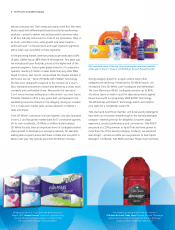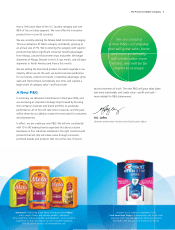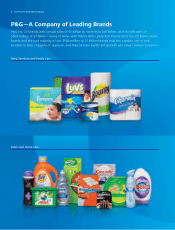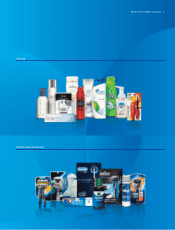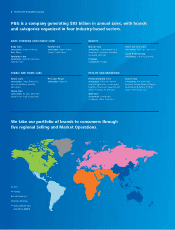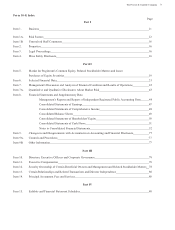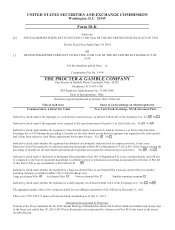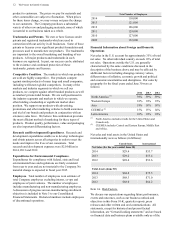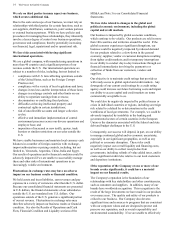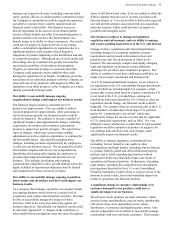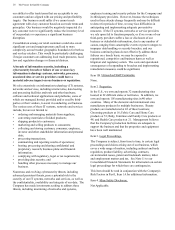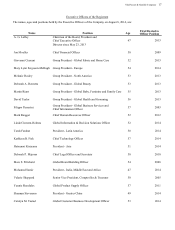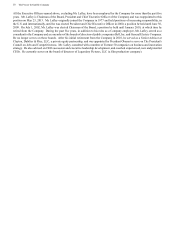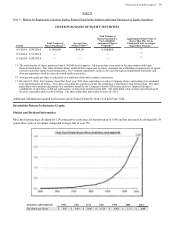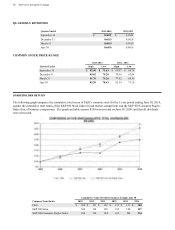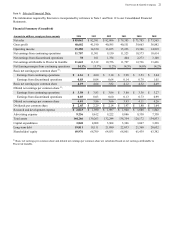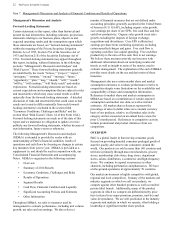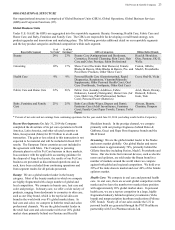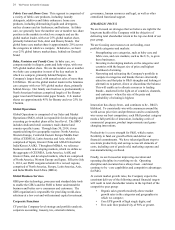Proctor and Gamble 2014 Annual Report Download - page 16
Download and view the complete annual report
Please find page 16 of the 2014 Proctor and Gamble annual report below. You can navigate through the pages in the report by either clicking on the pages listed below, or by using the keyword search tool below to find specific information within the annual report.14 The Procter & Gamble Company
We rely on third parties in many aspect our business,
which creates additional risk.
Due to the scale and scope of our business, we must rely on
relationships with third parties for certain functions, such as
our suppliers, distributors, contractors, joint venture partners
or external business partners. While we have policies and
procedures for managing these relationships, they inherently
involve a lesser degree of control over business operations,
governance and compliance, thereby potentially increasing
our financial, legal, reputational and/or operational risk.
We face risks associated with having significant
international operations.
We are a global company, with manufacturing operations in
more than 40 countries and a significant portion of our
revenue outside the U.S. Our international operations are
subject to a number of risks, including, but not limited to:
• compliance with U.S. laws affecting operations outside
of the United States, such as the Foreign Corrupt
Practices Act;
• compliance with a variety of local regulations and laws;
• changes in tax laws and the interpretation of those laws;
• changes in exchange controls and other limits on our
ability to repatriate earnings from overseas;
• discriminatory or conflicting fiscal policies;
• difficulties enforcing intellectual property and
contractual rights in certain jurisdictions;
• risk of uncollectible accounts and longer collection
cycles;
• effective and immediate implementation of control
environment processes across our diverse operations and
employee base; and
• imposition of increased or new tariffs, quotas, trade
barriers or similar restrictions on our sales outside the
U.S.
We have sizable businesses and maintain local currency cash
balances in a number of foreign countries with exchange,
import authorization or pricing controls, including, but not
limited to, Venezuela, Argentina, China, India and Egypt.
Our results of operations and/or financial condition could be
adversely impacted if we are unable to successfully manage
these and other risks of international operations in an
increasingly volatile environment.
Fluctuations in exchange rates may have an adverse
impact on our business results or financial condition.
We hold assets and incur liabilities, earn revenues and pay
expenses in a variety of currencies other than the U.S. dollar.
Because our consolidated financial statements are presented
in U.S. dollars, the financial statements of our subsidiaries
outside the U.S. are translated into U.S. dollars. Our
operations outside of the U.S. generate a significant portion
of our net revenue. Fluctuations in exchange rates may
therefore adversely impact our business results or financial
condition. See also the Results of Operations and Cash
Flow, Financial Condition and Liquidity sections of the
MD&A and Note 5 to our Consolidated Financial
Statements.
We face risks related to changes in the global and
political economic environment, including the global
capital and credit markets.
Our business is impacted by global economic conditions,
which continue to be volatile. Our products are sold in more
than 180 countries and territories around the world. If the
global economy experiences significant disruptions, our
business could be negatively impacted by reduced demand
for our products related to: a slow-down in the general
economy; supplier, vendor or customer disruptions resulting
from tighter credit markets; and/or temporary interruptions
in our ability to conduct day-to-day transactions through our
financial intermediaries involving the payment to or
collection of funds from our customers, vendors and
suppliers.
Our objective is to maintain credit ratings that provide us
with ready access to global capital and credit markets. Any
downgrade of our current credit ratings by a credit rating
agency could increase our future borrowing costs and impair
our ability to access capital and credit markets on terms
commercially acceptable to us.
We could also be negatively impacted by political issues or
crises in individual countries or regions, including sovereign
risk related to a default by or deterioration in the credit
worthiness of local governments. For example, we could be
adversely impacted by instability in the banking and
governmental sectors of certain countries in the European
Union or the dynamics associated with the federal and state
debt and budget challenges in the U.S.
Consequently, our success will depend, in part, on our ability
to manage continued global and/or economic uncertainty,
especially in our significant geographies, as well as any
political or economic disruption. These risks could
negatively impact our overall liquidity and financing costs,
as well as our ability to collect receipts due from
governments, including refunds of value added taxes, and/or
create significant credit risks relative to our local customers
and depository institutions.
If the reputation of the Company or one or more of our
brands erodes significantly, it could have a material
impact on our financial results.
The Company's reputation is the foundation of our
relationships with key stakeholders and other constituencies,
such as customers and suppliers. In addition, many of our
brands have worldwide recognition. This recognition is the
result of the large investments we have made in our products
over many years. The quality and safety of our products is
critical to our business. Our Company also devotes
significant time and resources to programs that are consistent
with our corporate values and are designed to protect and
preserve our reputation, such as social responsibility and
environmental sustainability. If we are unable to effectively


